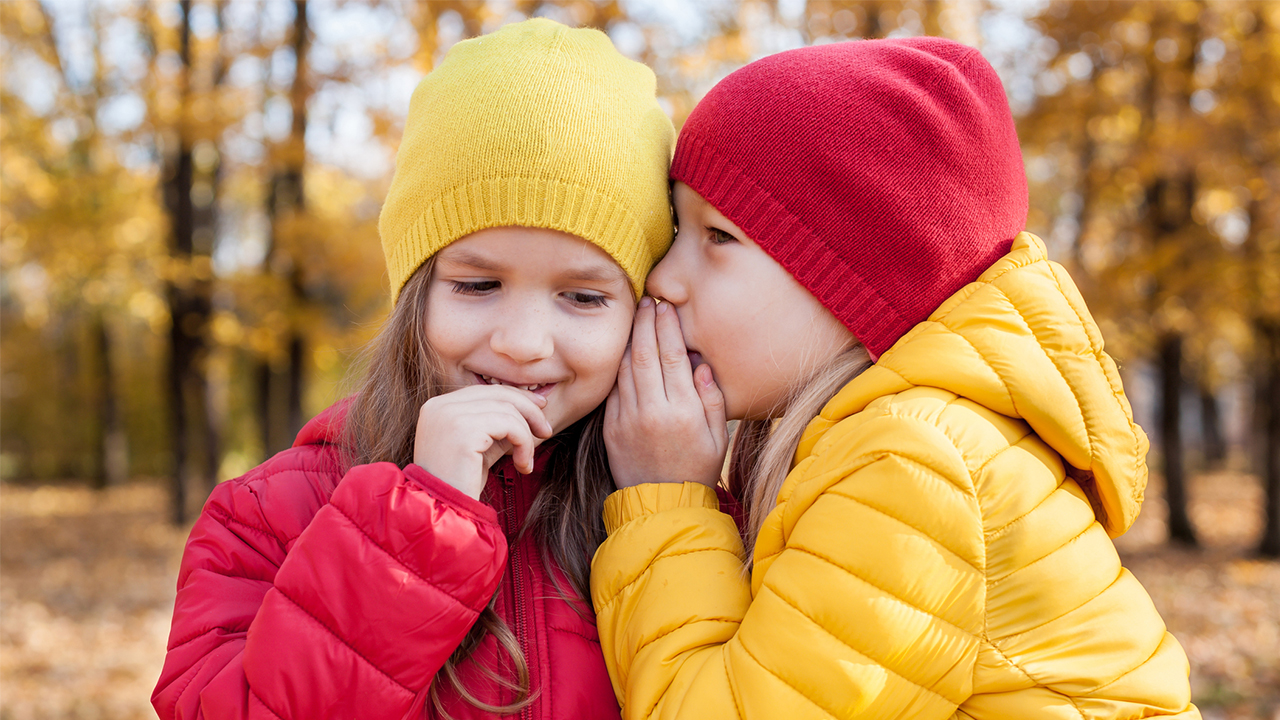Without daily interactions, my daughter fears she has no friends. She begs for playdates but hates FaceTime. She refuses to go outside. Sometimes she just sits and stares out the window.
My childhood friend, Ursula, and I are skipping down the driveway, our matching sets of braids streaming out behind us. We are seven years old and have no idea we are being photographed. Even from behind, you can tell that we are deep in conversation, our heads tilted towards each other, the intimacy of our friendship captured in a single, slightly blurry snap of the camera.
My childhood memories are delicately woven with little girl whispers: secrets murmured into newly pierced ears. Sleepovers peppered with fabricated terrors and an excuse to cling to each other and shriek beneath the covers, before erupting in giggles. “Friendship pins” made from safety pins threaded with tiny beads, traded and fastened to our dirty sneakers. These were the important rituals of childhood—of girlhood—shared with only my best and most trusted friend.
What happens to the whispers when a microscopic virus pushes them to the margins? Can secrets flourish when they are socially distanced?
The pandemic silences the whispers; stifles the giggles.
Now there is another photo, this time of my daughter, also seven years old, standing at the top of a tall climbing structure. She scans the empty playground like a sentry keeping watch, a spouse pacing atop a widow’s walk. She seeks a friend, hopefully one of her trusted girlfriends, though any friend will do. Her eyes, peeking over her face mask, are wide, expectant.
When a friend does arrive, shouting an excited greeting from 40 feet away, my daughter’s face lights up. The girls race at each other and instinctively duck their heads together, ready to make up for lost time. The parents hiss to step away, move back, stay six feet apart. We insist on face masks that, despite their bright colours and child-friendly patterns, muffle voices and hide any visual cue of emotion.
The girls droop, even as they continue to orbit around each other, desperate for connection.
I text Ursula, now living 2,000 miles away with her husband and two children, and we trade pandemic photos: her nine-year-old daughter doing a virtual drumming class; my daughter running free on the beach like she’s just been released from a cage; tired mothers desperate to keep the spark of childhood lit.
“How are you holding up?” I write.
“Not good,” she replies, and texts back a photo of herself looking exhausted, in full PPE, at the healthcare clinic where she works.
“I’m thankful to still be working, though,” she writes.
Our girlhood secrets have gotten lost in the day-to-day grind of being adults, especially during a pandemic. Beneath the surface, though, I know the bond is still there after 40 years of friendship.
My daughter’s bonds are not yet solidified, and her trust falters. From what I’ve read, seven year olds are just beginning to understand that friendships are defined by trust and intimacy, and not just play. They are highly invested in their friendships and feel a strong need to belong.
Without daily interactions, my daughter fears she has no friends. She begs for playdates, but she hates FaceTime, and she refuses to go outside. She talks to herself, filling the void with imaginary friends and a fantasy world of fairies and American Ninja Warriors. Sometimes she just sits and stares out the window.
At the playground, I relax my guard and let my daughter tiptoe closer to her girlfriends. They dive for the hidden corners of the playground where they can reveal their innermost thoughts under the play structure or behind the protective watch of a tree. I trust the face masks and wind to keep the virus at bay, because the science supports it but also because I can’t bear to take away the closeness she so clearly needs.
“What did you and M talk about?” I ask when we are walking home from the park, hand-in-hand.
“I can’t tell you,” my daughter replies. “It’s a secret. Well, not a secret but kind of.” Her eyes crinkle in the corners as she confesses that she and her friend have magic powers. “But don’t tell anyone,” she adds, and I promise.
Even as her school finally reopens, desks are pushed apart and lines are spray-painted on the ground to encourage distance. Invisible bubbles are drawn around each child’s work space. Now her teacher has inherited the task of holding kids away from each other.
The whispers of childhood are innocent and fleeting, and my daughter is missing them. When friendships are held at arm’s length, who will hear her secrets?
I can only hope that she will trust me to hear them until the whispers of childhood are allowed once more.
